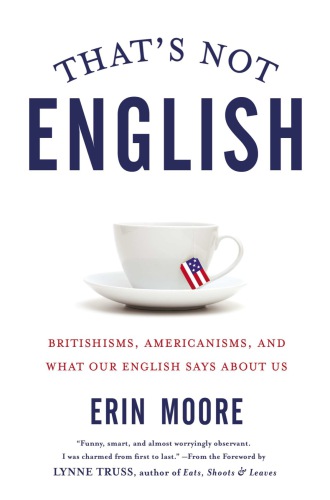
That's Not English
Britishisms, Americanisms, and What Our English Says About Us
کتاب های مرتبط
- اطلاعات
- نقد و بررسی
- دیدگاه کاربران
نقد و بررسی

February 2, 2015
As an American expatriate and book editor who lives in London, Moore is in an ideal position to see the truth to the longstanding joke that British English and American English are different languages. In this witty book, Moore delves into specific linguistic differences, unpacking what they say about our respective cultures. She groups her essays around individual words, using them to spin off into topics as varied as parenting (via "knackered," a state of exhaustion usually parental in nature), snacking ("bespoke," a word the English use to describe, among other things, sandwich bars), and relationships ("partner," a descriptor more inclusively used in the U.K.). She also delves deeply into nuances like how "Yankee" is defined âwhich differs both between the U.S. and U.K. (where all Americans are Yankees) and between different regions of the U.S. Moore manages to create a text that is eminently readable, clever (in the sincerely-intended American sense) and thought-provoking, gently breaking down some of the cultural stereotyping that plagues both Americans and British. The end result is something readers can readily share with friends on both sides of the ocean.

February 1, 2015
An author who grew up in Florida and now lives in London debuts with a breezy, and sometimes-irreverent, disquisition on the significance of certain slang locutions on both sides of the pond.Moore elects to follow what has become a popular organizational principle-what could be called the ten-objects-that-tell-Texas-history model. She examines 31 expressions (each with its own chapter) that, in most cases, exist on both sides of the Atlantic but often mean something different to native speakers. Sometimes, the differences are striking and illuminating. Early on, Moore explains why she focuses on England-not the British Isles, not the United Kingdom. Some of the locutions readers will expect: bloody, Yankee and way out (England's meaning: exit). But others are surprising and sometimes revelatory. The English term brolly, for example (umbrella), permits her to expatiate upon the differences in attitudes about the weather (the English expect lousy weather; Americans grouse about it). She uses the English term mufti (ordinary dress) to discuss why the English are more comfortable with school uniforms than Americans are. Very early in the text, Moore shows how the word quite varies in meaning. In America, a sentence like She is quite lovely indicates high praise; in England, the term is more an expression that indicates she's really not all that lovely. Occasionally, Moore weighs in on touchy cultural issues. The word partner, for example, has in England no connotation of homosexuality. She also enjoys employing some occasional potty humor. She mentions that neither the English nor the Americans are comfortable using the word toilet in conversation, so we've both developed different sets of euphemisms. She ends the section with this: "[I]f you don't give a shit what anyone thinks, you know what word you can use." Although Moore sometimes sees a bit too much significance in the differences, her brisk, self-effacing style is appealing.
COPYRIGHT(2015) Kirkus Reviews, ALL RIGHTS RESERVED.

























دیدگاه کاربران